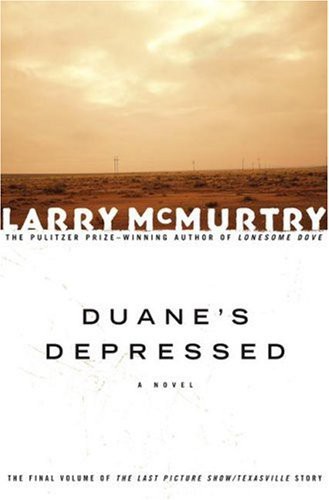
Duane's Depressed
The Last Picture Show Series, Book 3
کتاب های مرتبط
- اطلاعات
- نقد و بررسی
- دیدگاه کاربران
نقد و بررسی

Starred review from January 4, 1999
Pulitzer Prize-winning author McMurtry (Lonesome Dove) offers the final volume in the trilogy that includes the memorable The Last Picture Show (1966) and Texasville (1987). Drawing inspiration from the small Texas town where he grew up, McMurtry limns a wryly comic and finely nuanced portrayal of oil-rich Duane Moore, 62, a leading citizen of small-town Thalia. Depressed for no obvious reason, Duane vexes and bewilders family and community alike when he suddenly parks his identity-defining pickup truck in his carport and starts hoofing it everywhere. His wife, Karla, their adult kids and the small mob of humorously foul-mouthed grandchildren living under his roof grow more confused as his unsettling behavior escalates, especially when he moves to a crude shack six miles out of town. After he turns the family oil business over to eldest son Dickie (newly out of an Arizona drug-rehab center), the delicate symbiosis of the eccentric little town threatens to break down. Duane's symptoms intensify as he consults a comely psychiatrist in Wichita Falls and buys a fancy bicycle. Sudden tragedy disrupts the hero's therapy just as he is starting to come out of his yearlong deep freeze and, with regret and befuddlement, take a long look at his life. Using barren landscapes and drab interiors to emphasize the subtle, potent drama of Duane's search for himself, McMurtry shines as he examines the issues of alienation, grief and the confrontation with personal mortality. Despite a curious distance imposed by limiting the third-person narration almost exclusively to Duane--which at times renders the voice essentially journalistic--this novel represents McMurtry at the top of his form. Literary Guild and Doubleday Book Club featured alternates. (Jan.) FYI: Scribner is reissuing The Last Picture Show and Texasville in trade paper editions to honor completion of the Thalia trilogy.

September 15, 1998
In this finale to the saga set in Thalia, TX, main character Duane has reasons to feel blue. His children are into drugs and alcohol, his wife has struggles of her own, and friend Sonny is dying.

December 1, 1998
McMurtry has a rare and wonderful gift for creating settings and characters that he can revisit in subsequent novels without draining the well dry. After introducing Woodrow Call and Augustus McRae in "Lonesome Dove" (1985), he returned to their exploits in three additional novels. Here, McMurtry returns to the west Texas oil town of Thalia, first introduced in "The Last Picture Show "(1966). The characters, including Duane Moore and Sonny Crawford, were teenagers in the early 1950s, as television was beginning to erode the social bonds of small-town life. In "Texasville "(1987), McMurtry viewed some of the same characters during their prosperous but unfulfilling middle years. In the conclusion of this saga, Moore is 62 and surrounded by his substance-abusing children and his young grandchildren, whom he and his wife, Karla, are raising. The novelty of television is now an obsession for many townspeople, who gear their leisure time to their favorite cable channels of the moment. After a lifetime of "doing what's right," Duane wants out. Sick of the oil business, his pickup truck, and perhaps Thalia, he decides to walk everywhere, a sure sign of depression in car-crazed Thalia. As we watch Duane cope with his long-delayed midlife crisis, McMurtry eloquently and movingly examines themes of family bonds, enduring friendships, and the choices that determine how and for whom we live our lives. This is a funny, often disturbing, and always entertaining novel. ((Reviewed December 1, 1998))(Reprinted with permission of Booklist, copyright 1998, American Library Association.)

























دیدگاه کاربران